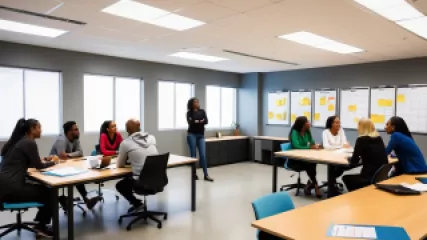Effective Strategies for Overcoming Procrastination in Workshops
Welcome to our comprehensive guide on effective strategies for overcoming procrastination in workshops. Procrastination is a common challenge that many people face when it comes to completing tasks and meeting deadlines. In a workshop setting, where productivity and efficiency are crucial, overcoming procrastination becomes even more important. Whether you're organizing a workshop or attending one, this guide will provide you with practical techniques and actionable steps to combat procrastination and optimize your productivity.
Understanding Procrastination
Before diving into the strategies, it's essential to understand what procrastination is and why it occurs. Procrastination refers to the act of delaying or postponing tasks despite knowing the negative consequences that may arise. It often involves engaging in unproductive activities instead of focusing on the task at hand.
Procrastination can stem from various factors, such as fear of failure, lack of motivation, perfectionism, or feeling overwhelmed by the workload. By recognizing the underlying causes of procrastination, we can develop effective strategies to overcome it.
Creating a Procrastination-Free Workshop Environment
A conducive workshop environment plays a significant role in minimizing distractions and fostering productivity. Here are some steps you can take to create an environment that supports participants in overcoming procrastination:
- Organize the workspace: Ensure that the workshop space is clean, clutter-free, and well-organized. A tidy environment promotes focus and minimizes distractions.
- Provide necessary resources: Make sure all participants have access to the materials, tools, and technologies they need to complete their tasks efficiently.
- Set clear expectations: Clearly communicate the workshop's objectives, timelines, and deliverables to all participants. This clarity helps to establish a sense of purpose and urgency.
- Encourage collaboration: Foster a supportive and collaborative atmosphere where participants can share ideas, seek advice, and hold each other accountable.
Practical Strategies to Overcome Procrastination
Now that we have set the foundation for a productive workshop environment, let's explore practical strategies and techniques to overcome procrastination:
1. Break Tasks into Smaller Steps
One common reason for procrastination is feeling overwhelmed by the size or complexity of a task. Breaking tasks into smaller, more manageable steps can make them less intimidating and easier to tackle. By focusing on one step at a time, you can build momentum and maintain a sense of progress.
2. Prioritize Tasks
Not all tasks are created equal. Prioritizing your tasks allows you to identify the most important and time-sensitive ones. Use techniques like the Eisenhower Matrix, which categorizes tasks based on their urgency and importance, to help you determine what needs to be done first.
3. Set Clear and Realistic Goals
Setting clear and realistic goals provides you with a sense of direction and purpose. Break down larger goals into smaller milestones, making it easier to track your progress. Ensure that your goals are specific, measurable, attainable, relevant, and time-bound (SMART).
4. Use Time Management Techniques
Effective time management is crucial for combating procrastination. Explore different time management techniques such as the Pomodoro Technique, time blocking, or creating a schedule to allocate dedicated time slots for specific tasks. Experiment with various methods to find what works best for you.
5. Minimize Distractions
Distractions can derail even the most well-intentioned individuals. Identify common distractions in your workshop environment and take steps to minimize them. This may include turning off notifications on your phone, using website blockers, or finding a quiet space to work.
6. Practice Mindfulness
Mindfulness is the practice of being fully present and engaged in the current moment. By cultivating mindfulness, you can increase your awareness of procrastination triggers and develop the ability to redirect your focus back to the task at hand.
7. Utilize Procrastination-Assistance Online Tools
The digital age has brought forth a plethora of tools designed to assist individuals in overcoming procrastination. Explore apps and software specifically developed for time management, task organization, and productivity enhancement. Examples include Trello, Todoist, and Forest.
8. Seek Accountability Partners
Accountability partners can provide support, encouragement, and hold you accountable for your actions. Find a colleague or friend who shares similar goals and challenges. Regular check-ins and discussions can help keep you motivated and on track.
9. Reward Yourself
Creating a system of rewards for completing tasks can serve as an effective motivational tool. After accomplishing a significant milestone or completing a challenging task, treat yourself to something you enjoy. It could be as simple as taking a short break, indulging in a favorite snack, or engaging in a hobby.
Procrastination Therapy Sessions
Sometimes, procrastination can be deeply ingrained and difficult to overcome independently. In such cases, seeking professional assistance through procrastination therapy sessions can be immensely helpful. Procrastination therapists are trained to identify the root causes of procrastination and provide tailored strategies to overcome it.
Procrastination therapy sessions typically involve individual counseling or group therapy. Through cognitive-behavioral techniques and other evidence-based approaches, therapists can help individuals develop healthier habits, improve self-discipline, and manage time more effectively.
Conclusion
Procrastination is a challenge that can hinder productivity and impede progress in workshops. However, by understanding the underlying causes of procrastination and implementing effective strategies, it is possible to overcome this hurdle and optimize your workshop experience. Remember to create a productive environment, break tasks into smaller steps, prioritize tasks, set clear goals, manage your time wisely, minimize distractions, practice mindfulness, utilize online tools, seek accountability partners, and reward yourself for your achievements. If procrastination persists, consider seeking professional assistance through procrastination therapy sessions. By taking proactive steps, you can conquer procrastination and maximize your potential in workshops and beyond.






